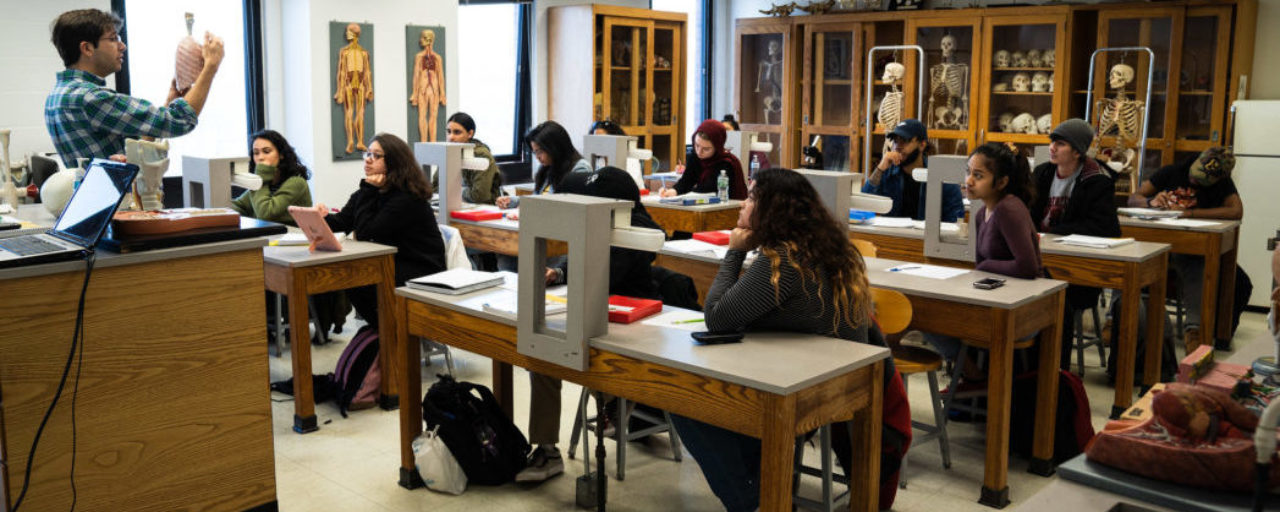Biology BS, Biology MS (Biotechnology concentration): combined degree

The combined accelerated program B.S./M.S. in Biology with allows students to earn both degrees for a total of 142 credits, instead of 161. Students are required to take 22 graduate credits and 120 undergraduate credits. Students must decide to be in this program by the end of their sophomore year and arrange their program for their junior and senior years in close consultation with their academic advisers.
The concentration in biotechnology is designed to provide the student with a thorough background in molecular and cellular biology, with emphasis on current developments in areas including genetics, immunology, microbiology, cell physiology, recombinant DNA techniques and cell and tissue culture. This program prepares students for careers in research or the health care professions, as well as careers in business, law and scientific writing.
Degree Plan
NOTE: All students are required to complete the General Education Requirements of their campus in fulfillment of their Bachelor degree requirements.
Candidates for a concentration in biotechnology must complete the courses required for the major in biology and include the following courses: BIOL3225, BIOL3226 General Microbiology; BIOL3345 Molecular Genetics; BIOL5306 Immunology; and BIOL6840 Cell Culture
Semesters 1 and 2
- BIOL1221, BIOL1222 Biological Diversity and Laboratory
- BIOL1223 Biological Diversity Recitation
- BIOL1233, BIOL1234 Introduction to Molecules, Cells and Genes and Laboratory
- BIOL1235 Molecules, Cells & Genes Recitation
Semester 3 and 4
- BIOL2200, BIOL2201 Ecology & Field Biology and Laboratory (or)
- MBIO2209, MBIO2219 Introduction to Marine Biology and Laboratory
- BIOL2300 Experimental Design
Semesters 5 and 6
- BIOL3100, BIOL3101 Genetics and Laboratory
- BIOL3238/BIOL3239 Human Structure & Function I and Laboratory
- BIOL3225/BIOL3226 General Microbiology and Laboratory
- BIOL3345 Molecular Genetics
Semesters 7 and 8
- BIOL4855/BIOL4856 Molecular Biology Techniques and Laboratory
- BIOL6240, BIOL6241 Molecular Cell Biology and Laboratory
- BIOL4950 Biology Seminar
- BIOL4405 Ethics in Science
- BIOL4950 Biology Seminar II
- BIOL5306 Immunology
- BIOL6840 Cell Culture
Semesters 9 and 10 (22 credits)
- BIOL6720 Molecular Biotechnology (3 credits)
- Graduate Biology Electives (19 credits) [Students may take any BIOL course at or above the “5000” level]
Cognate Requirements
Semesters 1 and 2
- CHEM1201, CHEM1203 General Chemistry I and Laboratory
- CHEM1202, CHEM1204 General Chemistry II and Laboratory
Semesters 3 and 4
- CHEM2261, CHEM2263 Organic Chemistry I and Laboratory
- CHEM2262, CHEM2264 Organic Chemistry II and Laboratory
Semesters 5 and 6
- PHYS2203 / PHYS2201 University Physics I Lecture and Laboratory
- PHYS2204 / PHYS2202 University Physics II Lecture and Laboratory
Major Requirements:
- Free Electives: May be chosen from any courses offered at the University after consultation with an advisor, but may include no more than six credits of “1000” level Biology courses. Physical Education is recommended for students to go on to schools of Veterinary Medicine.
- The Program is designed for students who plan to attend Graduate school or who wish to prepare for admission to a School of Medicine, Dentistry, Chiropractic, Optometry, etc., as well as those interested in entering directly into the workforce.
A minimum of 120 credits is required for the BS degree, and a minimum of an additional 22 credits for the MS degree.